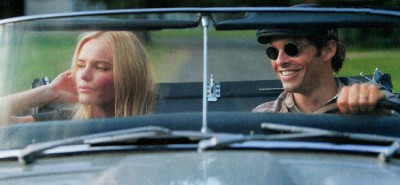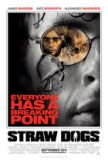| Reviews & Columns |
|
Reviews DVD TV on DVD Blu-ray 4K UHD International DVDs In Theaters Reviews by Studio Video Games Features Collector Series DVDs Easter Egg Database Interviews DVD Talk Radio Feature Articles Columns Anime Talk DVD Savant Horror DVDs The M.O.D. Squad Art House HD Talk Silent DVD
|
DVD Talk Forum |
|
|
| Resources |
|
DVD Price Search Customer Service #'s RCE Info Links |
|
Columns
|
|
|
Straw Dogs (2011)

Remaking Sam Peckinpah's Straw Dogs is, let's face it, a no-win situation. Always one of the more problematic films of the 1970s canon, the original is an ugly, brutish, fundamentally troublesome motion picture, and the degree to which it is either memorable or admirable (and that is a mileage that varies wildly) is based entirely upon the specificity of Peckinpah's direction and Dustin Hoffman's acting. Remove those elements, as you must in remaking it, and you've got a pretty basic thriller, with a scoch of rape thrown in for good measure. To call out any remake as specifically "unnecessary" is a dash down a rabbit hole (no remake is "necessary"--and, for that matter, no film is either), but the mere existence of a 2011 cover of Straw Dogs is, all things considered, befuddling. There's really no reason for this movie to exist.
So, that said, how is it? It is about as good as it could probably be, but that's not saying much. Screenwriter/director Rod Lurie (The Contender) makes a few basic changes to Peckinpah and David Zelag Goodman's script: the locale has switched from an English village to a small Southern town, the character of David (played here by James Marsden) from a mathematician to a screenwriter (that's a change that works; we never quite buy in the original that David would have the wife that he has, where here we're supplied with a believable back story). The film begins with David and his wife Amy (Kate Bosworth) arriving in her hometown; her father died recently, and they're going to fix up his barn while David works on a new script. Their first stop is the town bar and grill, where David immediately sticks out among the locals; this is a good scene, filled with tension and macho posturing, particularly from Charlie (Alexander Skarsgård), Amy's old high school boyfriend. Skarsgård plays the role with exactly the right measure of pleasant menace--"That's the way we do things around here," he tells David with a smile. "You'll get used to it."
David hires Charlie and his crew to do the barn work, which doesn't go so well; the crew arrives, sawing and hammering and blastic music, in the small hours of the morning, and departs a scant few hours later most days, to go hunting. David isn't terribly well-equipped to deal with these guys, and Amy keeps challenging his manhood by positioning him against them, in ways first subtle and then less so. Charlie and his guys end up taking David out on a hunting trip, abandoning him in the woods so that Charlie can go back to the house and give Amy what he thinks she's asking for.
Some of this material is both thoughtful and inciendiary; the conundrum presented by the roughnecks' unapologetic leering at Amy is a compelling one, both in how she can react to it, and how David can and should. But the picture doesn't get away clean here; Lurie is really no better than her antagonists, making sure to give us three separate lingering close-ups of her jiggling ass in jogging shorts (you've seen one in the trailers), and introducing us to her, in her very first shot, as only a mouth (she's applying make-up in the visor mirror). The song on the radio is "Going Down" by the Monkees, adding up to one of the cruder visual jokes in recent memory.
The rape sequence is the original film's most notorious, and Lurie, to his credit, does his level best to "fix" that scene--or, at the very least, its disturbing "no means yes" implications. But it still leaves us feeling as disgusted and unsettled as in the original. And whether or not it has actually been shorn of Peckinpah's misogyny, we're left to reflect that without that quality to contemplate, the rape truly is an entirely gratitious story point (since, in both versions, Amy never tells David about it, eliminating it as a motivating factor for the blood-spilling climax).
Straw Dogs was never exactly a model for subtlety, but much of the later dialogue between Charlie and David is too on the nose, and Lurie's new small-town football scenes, which intercut flashbacks to the rape with the bone-crunching on the field, are about as subtle as a blow to the head (to say nothing of the operatic montage of sex and violent imagery that follows, a sequence that Oliver Stone would have deemed too over-the-top).
Then, at long last, we arrive at the climactic stand-off, and to be fair, there is no disputing the skill and brutal efficiency of the sequence--it appeals, as the original did, to our basest animal instincts and fears, and does so ruthlessly. But the moral implications of it are as antiquated and suspect as ever. When David has finally had enough and strikes back, Charlie muses "Son of a bitch got some man in him after all," and that is not played as the backwards bullshit of some brain-dead redneck. We're intended to agree with him, that this bespectacled intellectual must devolve into a bloodthirsty killer to truly be a "man." But even granting that premise, David (and the audience) can only arrive at that point because the filmmakers so obviously and relentlessly stack the deck.
The most famous review of the original Straw Dogs was filed by Peckinpah admirer (and frequent defender) Pauline Kael, who called the plotting "a series of stratagems to get the characters into the positions that are wanted for a symbolic confrontation" and who, in that review's most-quoted line, called the picture "the first American film that is a fascist work of art." That's not quite a descriptor that can hold for this remake, which--though handsomely photographed and decently acted--will not be confused with art. On the earlier point, though? Kael wrote: "Not surprisingly, the audience cheers David's kills; it is, after all, a classic example of the worm turning." What the remake offers to those of us born after the original is the infinitely depressing experience of sitting in an audience and watching them react to the orgy of violence that closes the picture. Listening to their whoops, applause, and even laughter, I suddenly had a clearer idea of what Kael was talking about.
Jason lives in New York. He holds an MA in Cultural Reporting and Criticism from NYU.
|
| Popular Reviews |
| Sponsored Links |
|
|
| Sponsored Links |
|
|
| Release List | Reviews | Shop | Newsletter | Forum | DVD Giveaways | Blu-Ray | Advertise |
|
Copyright 2024 DVDTalk.com All Rights Reserved. Legal Info, Privacy Policy, Terms of Use,
Manage Preferences,
Your Privacy Choices | |||||||











